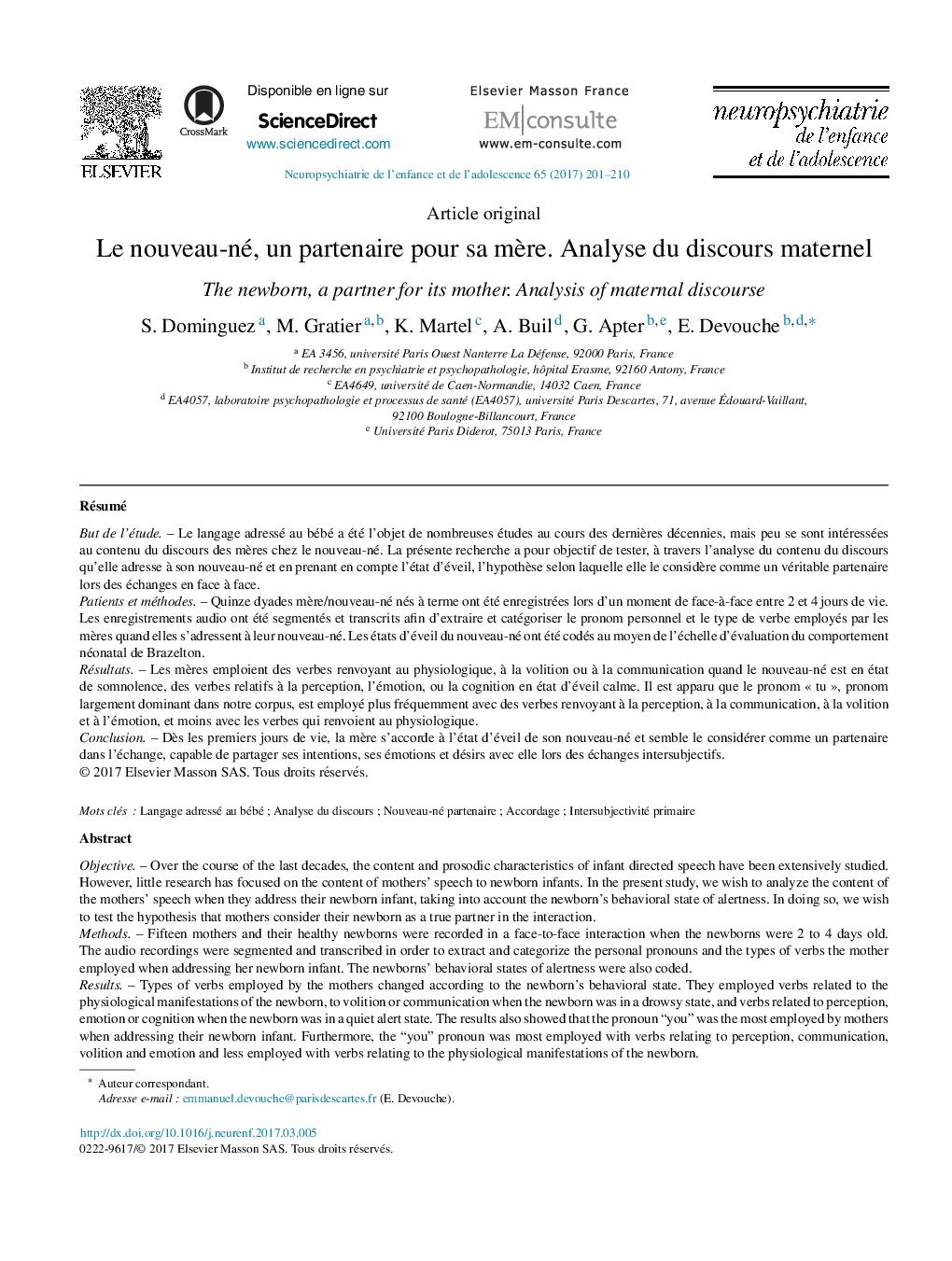| کد مقاله | کد نشریه | سال انتشار | مقاله انگلیسی | نسخه تمام متن |
|---|---|---|---|---|
| 5044940 | 1370642 | 2017 | 10 صفحه PDF | دانلود رایگان |

RésuméBut de l'étudeLe langage adressé au bébé a été l'objet de nombreuses études au cours des dernières décennies, mais peu se sont intéressées au contenu du discours des mères chez le nouveau-né. La présente recherche a pour objectif de tester, à travers l'analyse du contenu du discours qu'elle adresse à son nouveau-né et en prenant en compte l'état d'éveil, l'hypothèse selon laquelle elle le considère comme un véritable partenaire lors des échanges en face à face.Patients et méthodesQuinze dyades mère/nouveau-né nés à terme ont été enregistrées lors d'un moment de face-à -face entre 2 et 4 jours de vie. Les enregistrements audio ont été segmentés et transcrits afin d'extraire et catégoriser le pronom personnel et le type de verbe employés par les mères quand elles s'adressent à leur nouveau-né. Les états d'éveil du nouveau-né ont été codés au moyen de l'échelle d'évaluation du comportement néonatal de Brazelton.RésultatsLes mères emploient des verbes renvoyant au physiologique, à la volition ou à la communication quand le nouveau-né est en état de somnolence, des verbes relatifs à la perception, l'émotion, ou la cognition en état d'éveil calme. Il est apparu que le pronom « tu », pronom largement dominant dans notre corpus, est employé plus fréquemment avec des verbes renvoyant à la perception, à la communication, à la volition et à l'émotion, et moins avec les verbes qui renvoient au physiologique.ConclusionDès les premiers jours de vie, la mère s'accorde à l'état d'éveil de son nouveau-né et semble le considérer comme un partenaire dans l'échange, capable de partager ses intentions, ses émotions et désirs avec elle lors des échanges intersubjectifs.
ObjectiveOver the course of the last decades, the content and prosodic characteristics of infant directed speech have been extensively studied. However, little research has focused on the content of mothers' speech to newborn infants. In the present study, we wish to analyze the content of the mothers' speech when they address their newborn infant, taking into account the newborn's behavioral state of alertness. In doing so, we wish to test the hypothesis that mothers consider their newborn as a true partner in the interaction.MethodsFifteen mothers and their healthy newborns were recorded in a face-to-face interaction when the newborns were 2 to 4Â days old. The audio recordings were segmented and transcribed in order to extract and categorize the personal pronouns and the types of verbs the mother employed when addressing her newborn infant. The newborns' behavioral states of alertness were also coded.ResultsTypes of verbs employed by the mothers changed according to the newborn's behavioral state. They employed verbs related to the physiological manifestations of the newborn, to volition or communication when the newborn was in a drowsy state, and verbs related to perception, emotion or cognition when the newborn was in a quiet alert state. The results also showed that the pronoun “you” was the most employed by mothers when addressing their newborn infant. Furthermore, the “you” pronoun was most employed with verbs relating to perception, communication, volition and emotion and less employed with verbs relating to the physiological manifestations of the newborn.ConclusionFrom the first days of life, mothers attune the content of their speech to the newborns' behavioral sates. They seem to consider their newborn as a partner in the interaction, capable of sharing its intentions, emotions and desires with them.
Journal: Neuropsychiatrie de l'Enfance et de l'Adolescence - Volume 65, Issue 4, June 2017, Pages 201-210